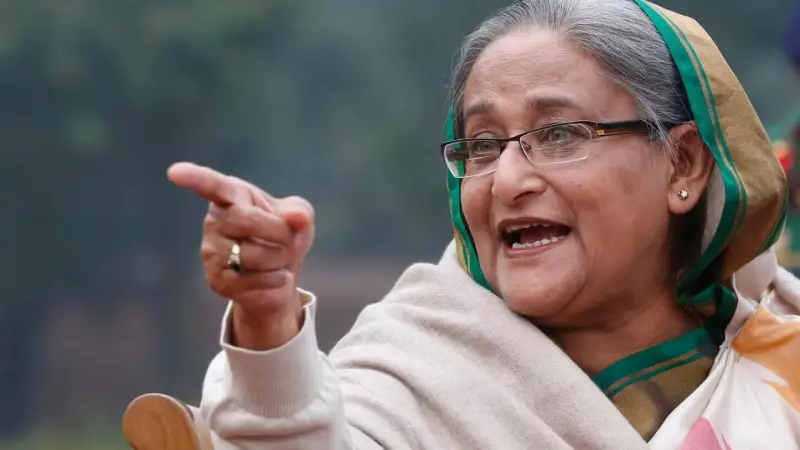
In a dramatic turn of events that has shaken South Asian politics, former Bangladeshi Prime Minister Sheikh Hasina has been sentenced to death in absentia by the very tribunal she established during her nearly two-decade rule. The verdict marks a stunning downfall for the daughter of Bangladesh's founding father, Sheikh Mujibur Rahman.
The Verdict That Shook a Nation
On a landmark day in June 2025, the International Crimes Tribunal (ICT-1) delivered a historic judgment against the 78-year-old former leader. Justice Md Golam Mortuza Mozumder declared Hasina guilty on three serious counts: incitement to violence, ordering the use of lethal force, and failure to prevent atrocities during the July-August 2024 protests.
The tribunal's 453-page judgment detailed how security forces under Hasina's command used helicopters, drones and live ammunition against unarmed protesters. The court found her responsible for mass killings in areas like Chankharpul and Ashulia, where evidence was allegedly destroyed by burning bodies.
Alongside Hasina, former Home Minister Asaduzzaman Khan (Kamal) also received a death sentence. The only co-accused present in court, former police chief Chowdhury Abdullah Al-Mamun, received a five-year prison term after turning state witness.
From Transformative Leader to Exiled Convict
Sheikh Hasina's political journey represents one of the most remarkable stories in Bangladesh's history. Elected in 2009, she oversaw major infrastructure achievements like the Padma Bridge and transformed Bangladesh into a global garment manufacturing hub. Under her leadership, the country recorded rapid economic growth and significant poverty reduction.
However, critics argue these achievements came at the cost of democratic institutions. International observers noted that Hasina gradually weakened independent courts, media and electoral bodies. Her landslide victories in 2014 and 2018 elections were marred by opposition boycotts and reported irregularities.
The Uprising That Changed Everything
The convictions stem from what became known as the "July Uprising" or "Monsoon Uprising" of 2024. What began as student protests against a quota system for government jobs quickly escalated into a nationwide movement against Hasina's rule.
Students were protesting a court decision to reinstate a policy reserving 30% of civil service posts for descendants of 1971 war veterans. The movement soon gained support from opposition parties and urban workers, leading to massive demonstrations across Bangladesh.
By July 19, 2024, the government imposed a curfew and nationwide internet blackout. Security forces and ruling-party student militias clashed with protesters in multiple cities. Human rights observers estimate between 800 to 1,400 people were killed, mostly by live ammunition from security forces, with thousands more injured.
The government initially reported around 800 deaths and 14,000 injuries, while United Nations investigators put the death toll closer to 1,400.
The Extradition Standoff with India
The verdict has created a diplomatic standoff between Bangladesh and India, where Hasina has been living in self-imposed exile since August 5, 2024. Bangladesh's government has invoked the 2013 extradition treaty with New Delhi, demanding Hasina's handover as a "mandatory obligation."
However, legal experts point out that the treaty contains a political-offense exemption, allowing India to refuse extradition if it deems the charges political in nature. Indian officials have so far only engaged "constructively" with Bangladesh and shown no indication of deporting the former leader.
From her exile in New Delhi, Hasina has called the verdict "biased and politically motivated" and rejected the proceedings as a "charade" orchestrated by political rivals. She has expressed willingness to stand trial internationally but refuses to recognize what she terms a domestic "kangaroo court."
Bangladesh's Turbulent Political History
This verdict represents the latest chapter in Bangladesh's often violent political history. The country has experienced repeated cycles of civilian rule and military intervention since gaining independence in 1971.
Hasina's father, Sheikh Mujibur Rahman, was assassinated in a military coup in 1975 after imposing a one-party system. The country then swung through decades of coups and military regimes, including the rule of General Hussain Muhammad Ershad until mass protests forced his resignation in 1990.
Even after democracy was restored, the army remained a powerful force, staging a virtual coup in 2007 by backing a technocratic caretaker government. The rivalry between the Awami League and Bangladesh Nationalist Party (BNP) has often turned politics into a zero-sum game, with neither side willing to accept defeat peacefully.
What Comes Next?
The death sentence has provoked both celebration and unrest in Dhaka, with security forces on high alert. The atmosphere remains tense, with fears that the verdict could escalate political instability ahead of planned elections in February 2026.
Hasina may still appeal the conviction through Bangladesh's Supreme Court, though she would need to return to the country to do so. Meanwhile, India has called for dialogue and remains "committed to the best interests of the people of Bangladesh."
One year ago, Sheikh Hasina stood as Bangladesh's most powerful leader, often described as its "Iron Lady." Today, she lives in exile, convicted of crimes against humanity, and sentenced to death by a tribunal she once controlled - a dramatic fall that underscores the volatile nature of Bangladesh's political landscape.






